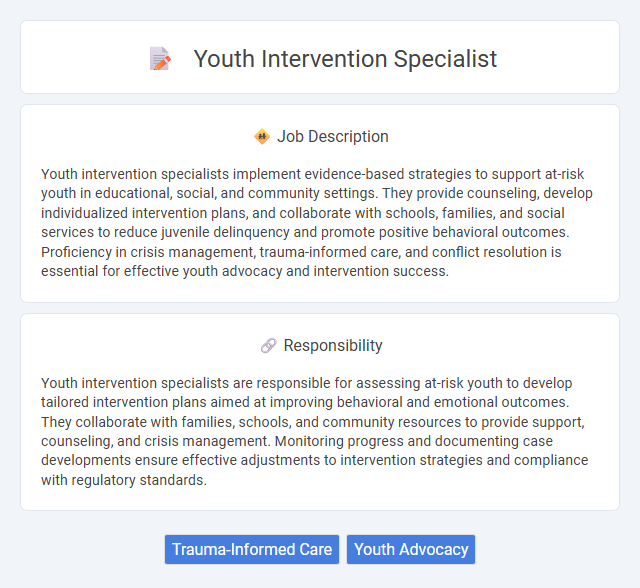
Youth intervention specialists implement evidence-based strategies to support at-risk youth in educational, social, and community settings. They provide counseling, develop individualized intervention plans, and collaborate with schools, families, and social services to reduce juvenile delinquency and promote positive behavioral outcomes. Proficiency in crisis management, trauma-informed care, and conflict resolution is essential for effective youth advocacy and intervention success.
Youth intervention specialists often work with adolescents facing behavioral, emotional, or social challenges, requiring individuals with strong empathy, patience, and communication skills. Those who possess resilience, conflict resolution abilities, and a genuine interest in youth development are likely suitable for this role. Conversely, people who struggle with high-stress environments or lack emotional stability may find this job challenging to handle effectively.
Qualification
A Youth Intervention Specialist must possess a bachelor's degree in social work, psychology, or a related field, with some roles requiring a master's degree for advanced intervention strategies. Essential qualifications include strong communication skills, experience in crisis intervention, and knowledge of adolescent development and behavioral health. Certifications in conflict resolution, counseling, or specific youth intervention programs enhance a candidate's ability to effectively support at-risk youth.
Responsibility
Youth intervention specialists are responsible for assessing at-risk youth to develop tailored intervention plans aimed at improving behavioral and emotional outcomes. They collaborate with families, schools, and community resources to provide support, counseling, and crisis management. Monitoring progress and documenting case developments ensure effective adjustments to intervention strategies and compliance with regulatory standards.
Benefit
Youth intervention specialist roles likely offer significant benefits such as the opportunity to make a positive impact on at-risk youth, contributing to their development and well-being. This job probably provides a sense of fulfillment and purpose, as specialists help navigate challenges that youth face in education, behavior, and social environments. Financially, positions in this field may include competitive salaries and benefits, alongside opportunities for professional growth and specialization.
Challenge
Youth intervention specialists likely face the challenge of addressing complex behavioral issues that stem from diverse social, economic, and family backgrounds. The probability of encountering resistance or mistrust from youths while trying to implement effective intervention strategies may increase the difficulty of fostering meaningful change. Balancing empathy with structure is expected to be a continuous hurdle in achieving positive outcomes for at-risk youth.
Career Advancement
Youth intervention specialists enhance their career prospects by gaining certifications in counseling and social work, which open opportunities for leadership roles in community programs. Expertise in conflict resolution and trauma-informed care makes them valuable candidates for supervisory positions within nonprofit organizations and government agencies. Continuous professional development in youth psychology and case management promotes advancement into program director or policy advisor roles.
Key Terms
Trauma-Informed Care
Youth Intervention Specialists skilled in Trauma-Informed Care implement strategies that address the complex emotional and psychological needs of at-risk youth. They create safe, supportive environments by recognizing trauma's impact on behavior and fostering resilience through tailored intervention plans. Proficiency in evidence-based trauma-informed practices enhances their ability to promote healing and positive developmental outcomes in diverse youth populations.
Youth Advocacy
Youth intervention specialists play a critical role in youth advocacy by addressing behavioral challenges and connecting at-risk young people to essential resources. They implement tailored intervention strategies that promote positive development, prevent juvenile delinquency, and ensure youths' voices are heard in social and legal contexts. Expertise in case management, conflict resolution, and community resource coordination supports effective advocacy and long-term success for vulnerable youth populations.
 kuljobs.com
kuljobs.com